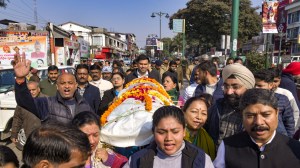100 per cent reservations anyone?
The move of the BJP-led NDA government towards legislating a separate quota for the economically backward among the 8220;forward8221; cast...

The move of the BJP-led NDA government towards legislating a separate quota for the economically backward among the 8220;forward8221; castes by amending the Constitution represents one step forward, two backwards. The gesture seems to be a desperate effort to consolidate the BJP votebank in keeping with the post-independence rat race of using reservations as a political tool.
Reservations for backward castes were enshrined in the Constitution at a time when the caste of a person also determined his class. People from the 8220;forward8221; communities, that comprised less than five per cent of the population, had cornered nearly 90 per cent of jobs by using socio-economic, political and religious devices. The majority was poor, illiterate, superstitious, totally at the mercy of the 8220;forwards8221; who ran the nation.
However, five decades after the reservation policy came into force, there is still a huge backlog of reserved seats pending for decades. No political party has yet bothered to come out with an authentic, country-wide or even a statewide survey on the exact backlog in various departments and why some seats especially Class I and II continue to remain vacant. Also, why the figures fulfilling the backlog is mainly that of Class III and Class IV posts. The total fulfilment of quotas is normally seen only among scavengers and sweepers in civic bodies.
The reservations for the scheduled castes and tribes were to last for a decade, but in the largest democracy of the world where numbers make a significant difference at the hustings the system was renewed every decade, irrespective of the party in power. In fact, the gains of using reservations as a political tool were so tempting that politicians hankered for extending such benefits to more and more communities. The implementation of the Mandal Commission, extending quotas to OBCs, was an instance of this. The trend continued unabated and the apex court had to step in and prohibit reservations above 50 per cent.
With the NDA8217;s move, it seems that the floodgates for the remaining 50 per cent are now being opened. Are we then heading for 100 per cent reservations? And if so, wouldn8217;t it be logical to fix the quota as per the population percentage of various communities? And if this were done, would the forward communities who are less in number but continue to dominate the education and employment fields agree? It is to get over such an impasse that the NDA has cleverly used the term 8220;economically backward classes8221;. If the government thinks that the economic criterion is the biggest hurdle in a person8217;s development, irrespective of his caste, would it be bold enough to scrap all caste-based reservations and evolve a single criterion 8212;economic backwardness8212;for the purpose? This seems unlikely as the government does not even have the courage to apply the 8220;creamy layer8221; criterion for SCs/STs. The creamy layer yardstick, which denies reservations to those who are not poor, is currently applicable only for the OBCs.
The country is at crossroads with a burgeoning population and a new world order brought in by WTO. Job opportunities, not only in government departments but also in the private sector, are diminishing at an alarming rate. Western models8212;which are not labour-extensive8212;are dominating all thinking on administrative policies and new armies of unemployed youth are joining the millions of those already rendered jobless.
But the government, and polity in general, does not seem to be waking up to this reality. The only solution for political organisations still seems to be reservations. Some are even demanding a quota for the backwards in the private sector, too, no matter how illogical this may sound.
By mooting reservations for the 8220;forwards8221;, the NDA government, too, has jumped on the bandwagon without any serious thought. It might boast of taking a step forward, but its lack of vision may end up pushing the country two steps backwards. 8220;The party with a difference8221; could have played a historic role by preparing the country to face the challenges of future. It seems to be doing the reverse by embracing the Congress tradition of appeasement for political gains. The new NDA proposal will sail through easily since no party would oppose it. But would it really help the needy 8212; and India 8212; in the long run?
- 01
- 02
- 03
- 04
- 05































